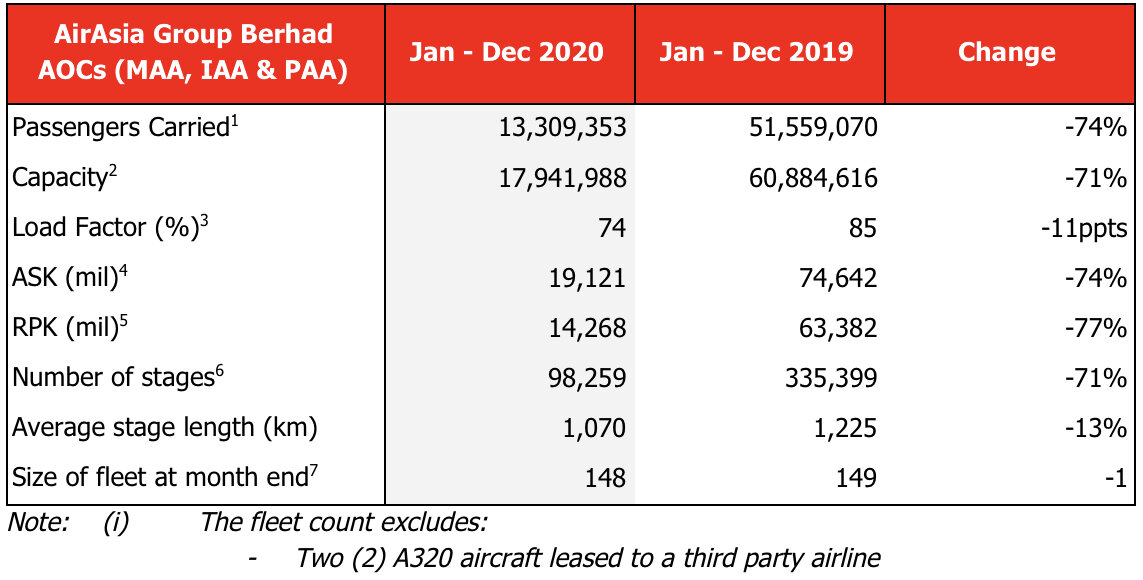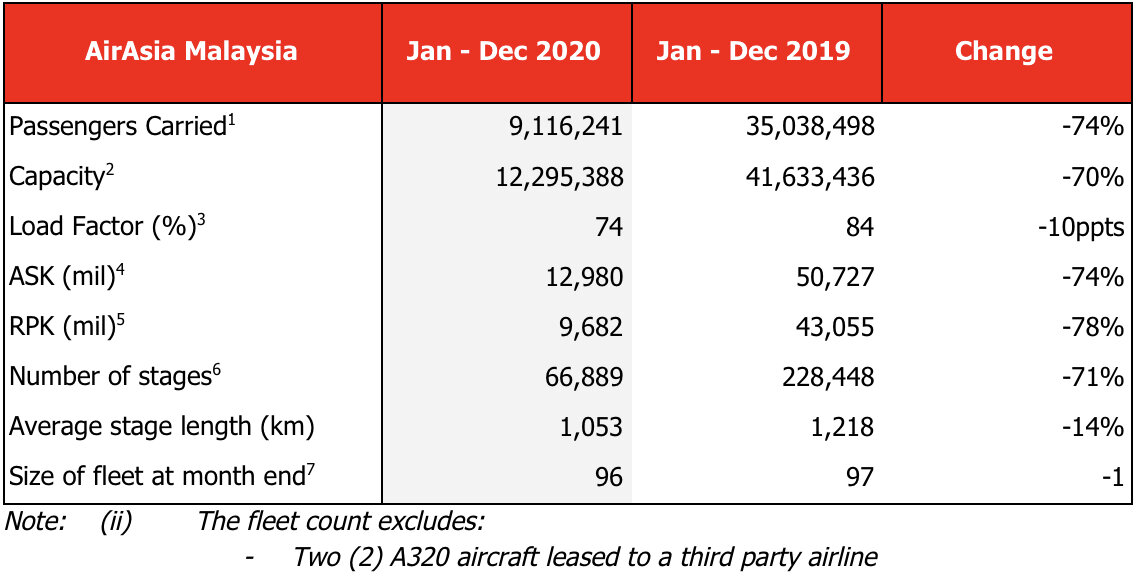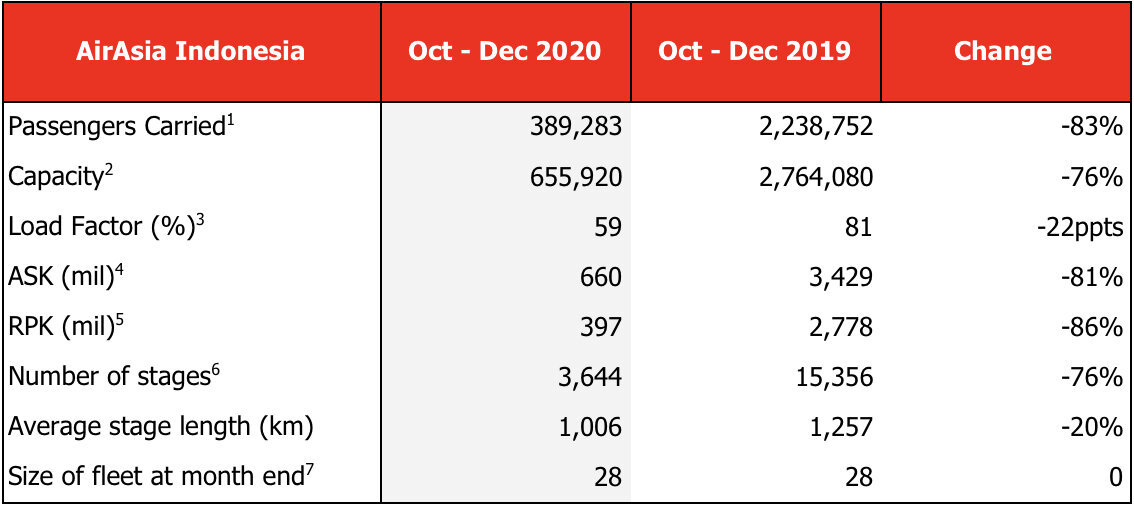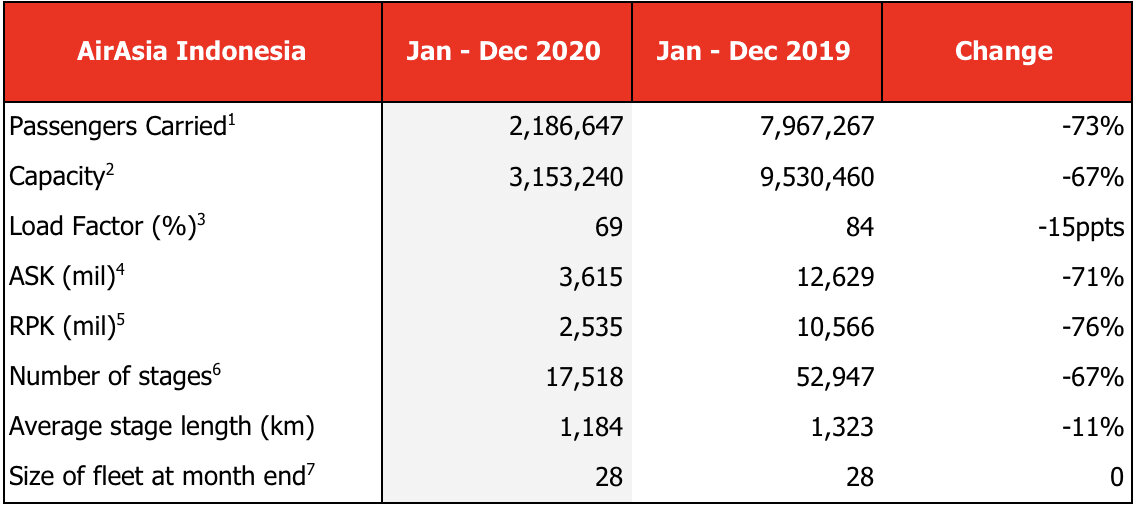AirAsia Group Berhad Preliminary Operating Statistics For the 4Q2020 and Full Financial Year 2020
AirAsia's 4Q2020 Operating Statistics Signify Solid Rebound
AirAsia Group Berhad (“AirAsia” or “the Group”) is pleased to present the operating statistics for the Fourth Quarter of the Financial Year 2020 (“4Q2020”) and the full Financial Year Ended 31 December 2020 (“FY2020”).
AirAsia is navigating its recovery phase exceptionally well as key operational metrics improved in December in comparison to September, notably with a 31% increase in passengers carried by AirAsia Thailand, doubling of passengers carried by AirAsia Philippines, while AirAsia Indonesia multiplied its number of passengers carried by a whopping 11 times. These improvements signify a solid domestic rebound for air travel demand across the Group’s key operating markets.
For the full year, 2020 was a year of resilience for all four AOCs, as each entity worked hard to overcome the ongoing challenges and together carried 23 million passengers. By December, the four AOCs recovered close to 60% of pre-Covid domestic capacity. Post-Covid, the Group expects to benefit from a leaner and optimised airline operation established in 2020, concentrating on recovering the most profitable and popular routes while exploring opportunities to gain market share.
AirAsia Malaysia closed the fourth quarter with 834,934 passengers carried on a healthy 72% load factor, despite the setback in October and November given the reimplementation of interstate travel restrictions. Following the easing of restrictions in December, strong pent-up demand positively translated into an immediate pick up in domestic travel.
AirAsia Indonesia posted a strong rebound in 4Q2020, as the number of passengers carried more than quintupled quarter-on-quarter (“QoQ”) to 389,283 passengers, while load factor improved to 59%, up 10 percentage points (“ppts”) from 3Q2020 as more flights resumed and travel restrictions eased. In December, AirAsia Indonesia more than tripled its operating capacity compared to November to match demand recovery. Operations remained primarily domestic, with domestic running at a remarkable 93% of pre-Covid capacity in December. The Group is encouraged by the strong rebound in demand and expects AirAsia Indonesia to fully recover to its pre-Covid domestic capacity in 1Q2021.
AirAsia Philippines carried 117,948 passengers in 4Q2020 and reported a load factor of 64%. On a month-to-month basis, AirAsia Philippines’ number of passengers carried doubled while domestic operating capacity increased by 5 ppts to 13% in December as compared to September.
AirAsia Thailand’s performance further gained momentum in 4Q2020, riding on strong domestic travel demand from the festive season and travel incentives from the government. AirAsia Thailand’s 4Q2020 operations exceeded expectations as it surpassed its pre-Covid domestic capacity by 7%. In December 2020, AirAsia Thailand operated 116% of pre-Covid domestic capacity, as compared to 96% in September 2020. AirAsia Thailand utilised 70% of its fleet by the end of December. More than 2.8 million passengers were carried during the quarter, an increase of 50% QoQ, resulting in a commendable load factor of 74%.
AirAsia Group Berhad Consolidated AOCs - Malaysia, Indonesia & Philippines
4th Quarter 2020 Operating Statistics
Full Year 2020 Operating Statistics
Malaysia
4th Quarter 2020 Operating Statistics
Full Year 2020 Operating Statistics
Indonesia
4th Quarter 2020 Operating Statistics
Full Year 2020 Operating Statistics
Philippines
4th Quarter 2020 Operating Statistics
Full Year 2020 Operating Statistics
Thailand
4th Quarter 2020 Operating Statistics
Full Year 2020 Operating Statistics
1) Number of earned seats flown. Earned seats comprise seats sold to passengers (including no-shows)
2) Number of seats flown
3) Number of Passengers Carried as a percentage of Capacity
4) Available Seat Kilometres (ASK) measures an airline’s passenger capacity. Total seats flown multiplied by the number of kilometres flown
5) Revenue Passenger Kilometres (RPK) is a measure of the volume of passengers carried by the airline. Number of passengers multiplied by the number of kilometres these passengers have flown
6) Number of flights flown
7) Number of aircraft including spares










